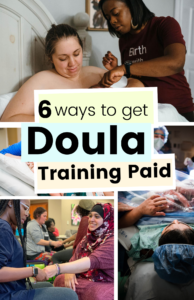
Starting your journey as a doula is an exciting step, but the cost of doula training can sometimes feel like a barrier. Fortunately, many aspiring doulas have successfully turned to their communities for support. By reaching out to local organizations, you can not only cover the cost of doula training but also begin building valuable connections that support you as a doula. Here’s how you can seek out funding from community organizations, create meaningful partnerships, and confidently ask for financial support.
Why Seek Community Support for Doula Training?
Getting your doula training funded by a community organization not only helps with costs but also creates a collaborative way to give back. Many organizations—small charities, faith-based groups, health centers, sororities, and birth justice organizations—are open to funding doula training in exchange for you supporting their clients. This creates a powerful opportunity for you to grow as a doula while positively impacting others in your community.
1. Identify Potential Community Partners
You may find support from a variety of groups that align with your mission. Here are a few types of organizations to consider:
- Local Charities: Many charities have health and wellness initiatives that could align with doula work. Organizations dedicated to family services, health, or maternal wellness may see value in supporting a doula to benefit community members.
- Faith-Based Organizations: Churches, mosques, and synagogues often support health and social service initiatives, particularly if you’re willing to work with members or community groups they serve.
- Hospitals and Health Clinics: Some hospitals have charity arms or community outreach initiatives to support training costs, especially if you can provide doula services for under-resourced parents.
- Sororities and Affinity Groups: Many sororities, particularly those with a strong community service focus, may be open to funding doula training as part of their commitment to health and wellness. Sorority connections can also be a valuable support network as you start your doula career.
- Birth Justice Organizations: Groups dedicated to improving birth equity are often supportive of doulas, especially those serving marginalized communities. Funding from these organizations could align with their mission to improve birth outcomes and support birth rights.
By identifying the right partner, you’re setting yourself up for a mutually beneficial relationship that can deepen your role within the community.
2. Prepare Your Pitch
Once you’ve identified organizations that might be a good fit, it’s time to approach them with a well-thought-out proposal. Here’s a straightforward outline to help you structure your pitch:
- Introduce Yourself and Your Goal: Start by sharing a bit about who you are and why you’re passionate about becoming a doula. Let them know how you plan to make a positive impact in the community.
- Explain How Your Training Will Benefit the Community: Highlight how your doula work can improve maternal health, offer emotional and physical support to parents, and create a network of care for families in need.
- Suggest Ways to Give Back: Offer a way to return the support, such as attending a set number of births, supporting specific groups they work with, or providing educational talks or workshops.
3. Funding Options and Inspiring Examples
When it comes to funding doula training, creativity and community support go hand-in-hand. Here are some examples to inspire you:
- Direct Sponsorship: One doula approached a local hospital’s charity group, requesting that they fund her training in exchange for attending births for parents who couldn’t otherwise afford a doula. The hospital agreed—and later funded another doula after seeing the impact!
- Affinity Group Sponsorship: Another aspiring doula reached out to a local sorority that wanted to support a member’s access to doula care. In exchange for attending one birth, her training was covered, and the community gained a trained doula.
- Crowdfunding: Some doulas have turned to platforms like GoFundMe or similar sites to raise funds, with community members contributing to support their journey. Crowdfunding can be a great option for those who prefer not to have any specific obligations.
These examples highlight how valuable community support can be and may give you ideas for how to structure your own request.
4. Setting Clear Terms with Community Sponsors
Before accepting funds, make sure you and your sponsor understand any expectations. Whether you’re agreeing to attend a certain number of births, provide educational sessions, or support specific groups, it’s essential to clarify terms to avoid misunderstandings down the line. Approach these discussions as a collaborative effort—you’re creating a partnership that benefits both you and the community.
5. How to Talk About the Community Impact of Doula Training
When asking for support, emphasize the larger impact that having a community-funded doula can have:
- Improved Maternal Health: Doulas are shown to positively influence maternal health outcomes, helping to create healthier and more satisfying birth experiences for families.
- Increased Access to Birth Support: For many, doula support isn’t always accessible. By training more doulas with community backing, you can help fill this gap for families who need it most.
- Stronger Community Networks: A community that supports its doulas is building a network of care, compassion, and support that benefits everyone.
By focusing on these points, you can show how your training isn’t just a personal goal—it’s an investment in the health and well-being of the entire community.
6. Simple Outline for Reaching Out
Here’s a simple structure to help you write an effective funding request:
- Opening: Introduce yourself and explain your goal of becoming a doula.
- Explain Your Ask: Clearly state that you’re seeking financial support for your training, which costs around $600-800. Some doulas ask for less because they can fund part of it themselves, while others ask for slightly more to cover childcare during training or items for their birth bag.
- Community Benefit: Share how you plan to give back, such as by supporting specific groups or giving educational talks.
- Express Your Passion and Commitment: Highlight why this is important to you and how it aligns with their mission.
- Close with Gratitude: Thank them for considering your request and for their role in supporting maternal and family health.
Moving Forward with Confidence
Asking for support from your community is a powerful first step on your doula journey. By connecting with local organizations and sharing your vision, you’re not only funding your training but also building meaningful partnerships that will support you as you grow. Remember, you’re creating a shared benefit for your community, so approach this process with confidence, warmth, and a clear sense of purpose.
By breaking down the process and sharing relatable examples, this guide can help you take actionable steps toward finding community support for your doula training. You’re not only starting a career but also building a network of people invested in your success and the well-being of families in your community. Happy networking, and here’s to your journey as a doula!
What to Do if They Say No
If a community organization isn’t able to fund your doula training, don’t be discouraged—there are other options to explore! Many doulas have found success through scholarships specifically for birth work, and some organizations, like DONA International’s IMPACT Program, offer funding to help cover training costs. Or maybe you qualify as a military spouse for MYCAA Funding.
Crowdfunding platforms like GoFundMe or social media fundraisers are also popular ways to gather support from friends, family, and your extended network.
Additionally, consider asking if the organization could help in other ways, like allowing you to shadow experienced doulas or connecting you with local mentors. Every connection you make strengthens your network, bringing you closer to reaching your goal!
Read also: Creative Ways to Fund Your Doula Training







